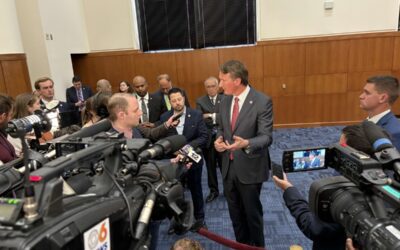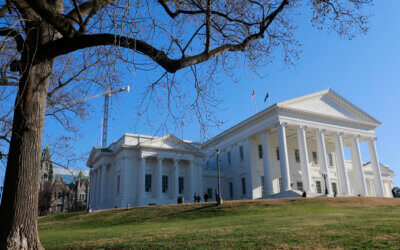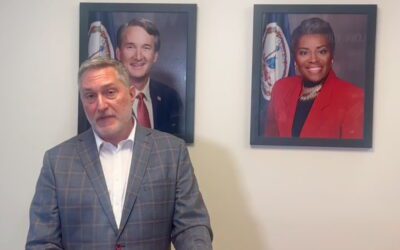
(AP photo/Steve Helber)
On Wednesday, Jan. 10, 2024, Virginia’s General Assembly officially convened in Richmond, kicking off a 60-day legislative session that could have huge impacts on the lives of folks who live in the commonwealth.
The most impactful event of the first day of session, though, was the election of the Speaker of the House of Delegates. After Democrats won a 51-49 majority in the chamber last November, lawmakers selected Del. Don Scott as the first Black speaker in the House’s 405-year history.
The legislature seated this week is Virginia’s most diverse ever and significantly younger than in past years.
“In the Senate, I went from being the third-youngest member to being the 11th at age 52,” said new Senate Majority Leader Scott Surovell. “I can tell you this: Our basketball team’s going to be a lot better.”
Much of the rest of the session’s impact will come via Virginia’s two-year budget, which the legislature and governor must approve. The Democratic-majority House and Senate and Republican Gov. Glenn Youngkin appear to have significantly different visions about how to spend state resources and fund policy priorities over the coming biennium. In the budget he submitted in late December, Youngkin called for increasing the state’s sales tax while cutting income taxes, a move that will disproportionately benefit the wealthy and burden lower-income Virginians.
According to an analysis by the Commonwealth Institute and the Institute on Taxation and Economic Policy, the income tax cuts and sales tax hike would leave the bottom 20% of earners paying an average of $44 more in taxes per year, while the top 1% would pay about $9,600 less.
The analysis also found that the sales tax hike would hurt low-income people more than the income tax cuts would help them, in part because these Virginians spend far more of their resources on necessities. The bottom 10% of earners in Virginia would pay a 6.5% share of the overall sales tax increase, while the wealthiest 1% would pay 4.7% of it. Additionally, the top 1% of earners in Virginia would receive more than 20 times the benefit of the proposed income tax cuts than the bottom 10% of earners.
Democratic lawmakers immediately criticized the governor’s tax proposal and have pledged to reject it.
“We firmly oppose any measure that will undermine the economic stability of our citizens, especially the most vulnerable among us,” Speaker Scott announced after the governor released his budget. “We must champion policies that address the pressing issues faced by our citizens – not those that would be detrimental to the financial well-being of low-income and middle class households, exacerbating economic disparities.”
In a newsletter to his constituents, Sen. Adam Ebbin described the governor’s budget as “fundamentally unserious,” and Surovell accused Youngkin of using “a bunch of revenue gimmicks and sleights of hand to make it appear it was balanced.”
“The reality is, we’re going to have to start from square one in writing a budget,” he said.
Even some members of the governor’s own party are balking at his tax proposals.
Republican Sen. Bill Stanley, who represents rural areas of Southside Virginia, described the budget as “tone-deaf,” accusing Youngkin of leaving regions of the state that helped elect him ”on the side of the road.” Stanley said that proposed budget items like the sales tax increase and cuts to education funding will disproportionately hurt rural residents and indicated that he would not support the governor’s plan.
Last week, Republican Sen. David Suetterlein said in an interview that he is “not interested in raising the sales tax,” calling it “very regressive.”
Another potentially contentious item that the legislature will consider this year is a proposed new sports arena and entertainment complex in Northern Virginia that is intended to lure the Washington Capitals and Washington Wizards to the commonwealth.
Building the $2 billion, 12-acre facility appears to be a major priority for Youngkin, but he can’t do it without the legislature creating a body – a sports and entertainment authority – with the power to issue nearly $1.5 billion in bonds to fund the project. Virginia would also have to make an upfront investment of up to $200 million of redirected transportation funds. According to a study produced by JPMorgan, the net cost to taxpayers would ultimately be an estimated $1.35 billion.
Youngkin claims that the funds Virginia would be putting forward for the project would largely come from revenue that will be generated by the development and would not exist otherwise.
But the governor will need support from legislators all across the state to set the project in motion, which could be a challenge unless he can convince them that the arena investment will benefit everyone, not just Northern Virginia – or unless he’s willing to trade other regional benefits for approval of the project.
Democratic Sen. Louis Lucas, who’s now both the most powerful and longest-serving member of the Senate and has immense influence over state funds as chair of the Senate Finance and Appropriations Committee, has already made clear that she won’t support a sports and entertainment authority unless state funds are also used to help her constituents in the other end of Virginia’s urban crescent.
“Anyone who thinks I am going to approve an arena in Northern Virginia using state tax dollars before we deliver on toll relief and for public schools in Hampton Roads must think I have dumbass written on my forehead,” Lucas posted on X (Twitter) in late December.
While the budget and sports arena debates may dominate headlines for much of this year’s legislative session, lawmakers will make crucial decisions about many other issues over the coming months.
Education advocates have already come out in opposition to the education proposals in Youngkin’s proposed budget.
Youngkin claims his proposed budget makes a “record $24 billion investment” in Virginia’s public schools, but Virginia Education Association president Dr. James Fedderman contends that the governor’s “smoke and mirrors” approach to funding will effectively reduce state investment in public K-12 schools by $300 million compared to current spending.
Youngkin also included modest salary increases for public school teachers in his budget: a 1% increase in 2024 and a 2% increase in 2025. But the VEA points out that these meager pay bumps fail to keep pace with inflation. When adjusted for inflation, teacher salaries would effectively decrease over the next two years. Virginia continues to grapple with a teacher shortage crisis, and the governor’s failure to meaningfully increase teacher salaries could hinder efforts to attract more to the profession.
“The handful of relatively small education investments, far outweighed by cuts, are an insult to educators and families and don’t come close to what’s needed to improve academic outcomes for students or get educator pay to the national average,” said Fedderman.
With the majorities they won in November’s elections, House and Senate Democrats are likely to force Youngkin to take stands on a number of hot-button issues he was able to avoid in previous sessions, thanks to Republican and Democratic majorities killing the other party’s legislation regarding these topics in their respective chambers.
While Democrats lack the numbers in the legislature to override gubernatorial vetoes, they’re still likely to send Youngkin bills representing their policy priorities, including banning the sale and possession of assault-style firearms, establishing a prescription drug affordability board, protecting those seeking or providing abortion care from being extradited to other states for criminal prosecution, and marijuana retail sales.
Democrats also plan to bypass Youngkin on some issues by passing constitutional amendments that repeal the state’s ban on same-sex marriage, protect reproductive rights, and automatically restore voting rights to people convicted of felonies.

Progressive Dem eyes Virginia congressional bid amid possible redistricting
State Del. Sam Rasoul of Roanoke says he supports Medicare for All, a Green New Deal, and an end to US military support for Israel. In the wake of...
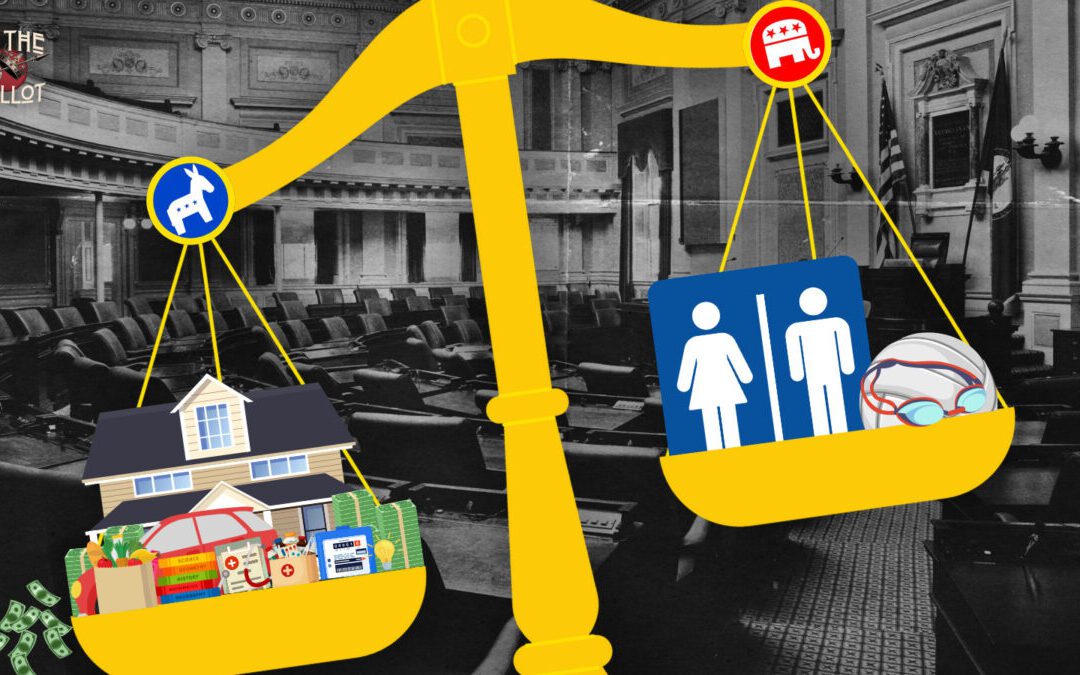
Commentary: The costs of being in the majority
Democrats won on issues of affordability and working-class concerns. Now it’s time to deliver. Governor-elect Abigail Spanberger and Virginia...

Meta’s ‘teen safety’ tools are failing Virginia kids—and Gov. Glenn Youngkin isn’t helping
Parents and cybersecurity experts want Virginia lawmakers to hold companies like Meta accountable when their platforms fail to keep their pledges to...

‘Ticket to Ride’ and pickle sandwiches: The family life behind Abigail Spanberger’s campaign
Remember the viral victory speech with the toddler under the podium? That kid’s mom could be Virginia’s next governor. On Nov. 4, Democratic...
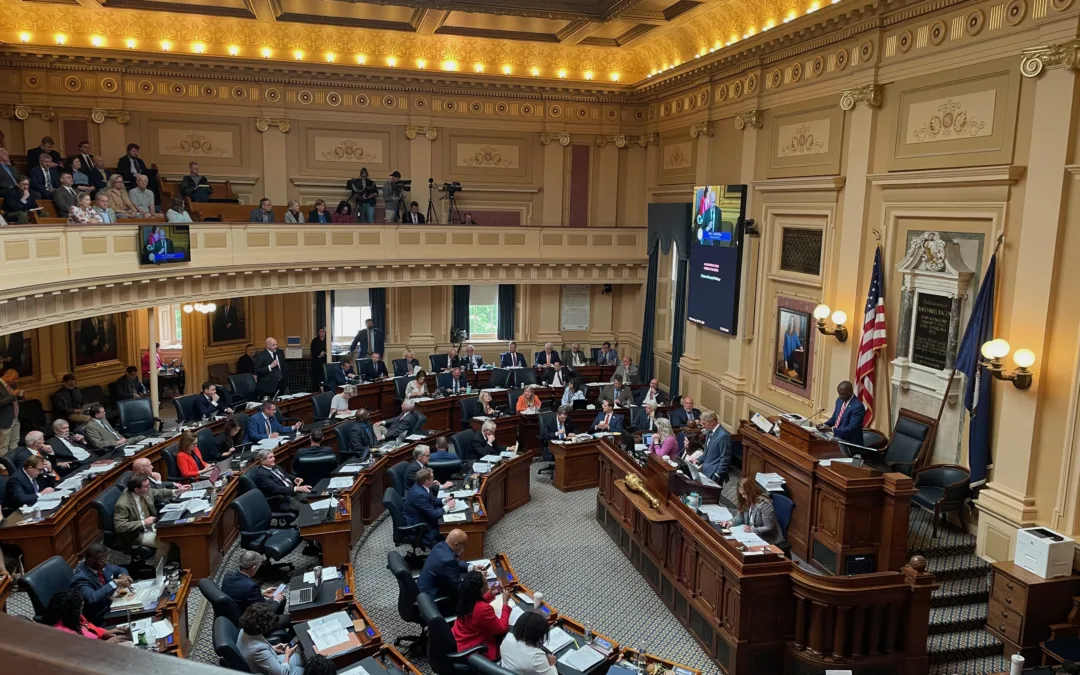
Virginia Dems enter redistricting fight in response to Trump’s power grab
Lawmakers are reportedly reconvening in Richmond on Monday with plans to redraw the state’s congressional maps to counter several Republican-led...

OPINION: Why Virginia families deserve paid leave
Ana walked into my pediatric clinic in Northern Virginia with her six-week-old daughter. As we weighed her baby for the fourth time this month, we...



